#full stack courses
Explore tagged Tumblr posts
Text
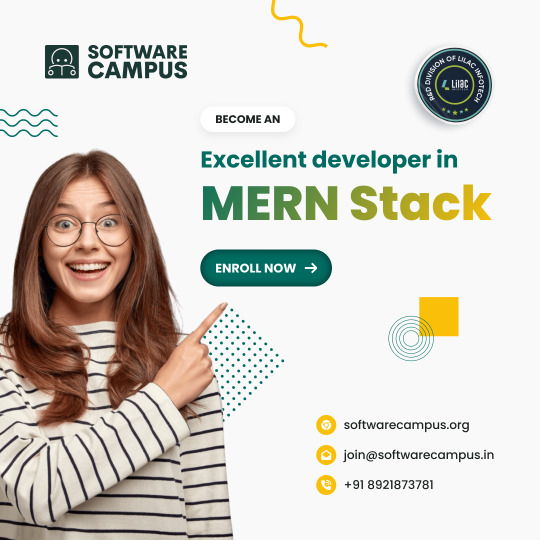
🚀 Master MERN Stack Development with SCCP! 🌟 Become a Pro in the World of Web Development. 💼 Join our SCCP Program now! 📞 Contact us at +91 8921873781 or ✉️ Email us at [email protected]. 👩💻 Seats are filling fast! Secure Your Spot Today!
#mern stack#full stack courses#IT courses#mobile app#internship#six month#3 month#hiring#job oriented#cyberpark#kozhikode#calicut#kerala#web development#mobile app development#software institute#job#techjob#mern stack developers#MERNSTACK development#software
0 notes
Text
what is it about being a customer that makes people lose the ability to use their heads
#self scan is where the brave are separated from the foolish#Guy needed a basket so what he does is ignore the stack of baskets just down the aisle#& take everything out of a full basket of stuff that needs to be reshelved and puts it all on the ground.#Okay. Fucking thank you#& Somebody abandoned their checkout with a billion things scanned and it wasn’t letting me suspend the whole thing#so i had to cancel every individual item#and of course i can’t just stand around doing that so i was doing it when i had a chance#so the till is opened up to show ppl it’s out of service#& i turn my back what happens.#Some fucking shit for brains goes scanning all his shit with the till clearly out of service#giving me more shit to cancel#And to make matters worse i saw my creepy ex coworker.#And of course he had a billion problems with his checkout so i couldn’t avoid him#Ifs always the four hour shifts that are the hardest…
20 notes
·
View notes
Text
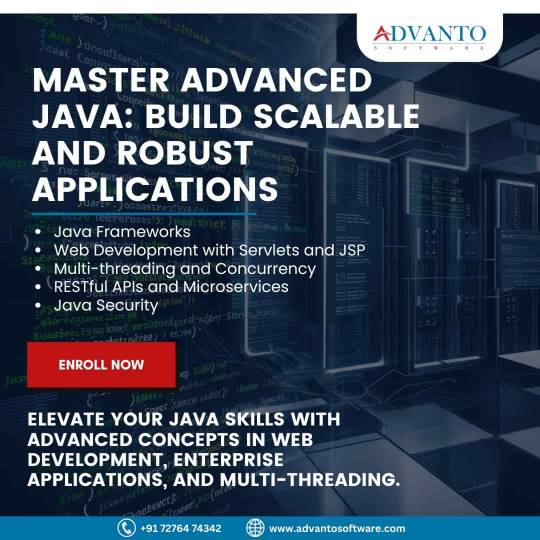
Level up your Java expertise! Master advanced concepts to build scalable, robust applications. From web dev to microservices, take your skills to new heights. Enroll now and become a Java pro!
Visit www.advantosoftware.com or call +91 72764 74342 to transform your data into actionable intelligence. Don't just follow trends—set them with Advanto!
3 notes
·
View notes
Text
The Roadmap to Full Stack Developer Proficiency: A Comprehensive Guide
Embarking on the journey to becoming a full stack developer is an exhilarating endeavor filled with growth and challenges. Whether you're taking your first steps or seeking to elevate your skills, understanding the path ahead is crucial. In this detailed roadmap, we'll outline the stages of mastering full stack development, exploring essential milestones, competencies, and strategies to guide you through this enriching career journey.

Beginning the Journey: Novice Phase (0-6 Months)
As a novice, you're entering the realm of programming with a fresh perspective and eagerness to learn. This initial phase sets the groundwork for your progression as a full stack developer.
Grasping Programming Fundamentals:
Your journey commences with grasping the foundational elements of programming languages like HTML, CSS, and JavaScript. These are the cornerstone of web development and are essential for crafting dynamic and interactive web applications.
Familiarizing with Basic Data Structures and Algorithms:
To develop proficiency in programming, understanding fundamental data structures such as arrays, objects, and linked lists, along with algorithms like sorting and searching, is imperative. These concepts form the backbone of problem-solving in software development.
Exploring Essential Web Development Concepts:
During this phase, you'll delve into crucial web development concepts like client-server architecture, HTTP protocol, and the Document Object Model (DOM). Acquiring insights into the underlying mechanisms of web applications lays a strong foundation for tackling more intricate projects.
Advancing Forward: Intermediate Stage (6 Months - 2 Years)
As you progress beyond the basics, you'll transition into the intermediate stage, where you'll deepen your understanding and skills across various facets of full stack development.
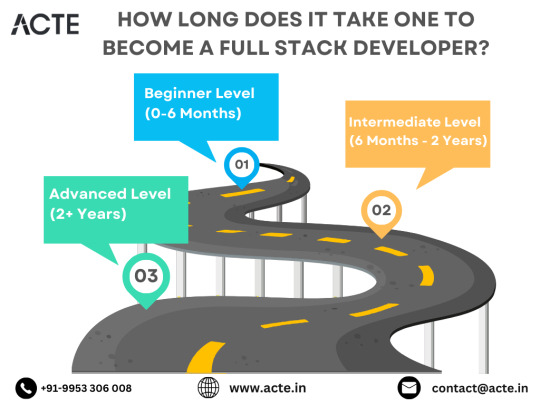
Venturing into Backend Development:
In the intermediate stage, you'll venture into backend development, honing your proficiency in server-side languages like Node.js, Python, or Java. Here, you'll learn to construct robust server-side applications, manage data storage and retrieval, and implement authentication and authorization mechanisms.
Mastering Database Management:
A pivotal aspect of backend development is comprehending databases. You'll delve into relational databases like MySQL and PostgreSQL, as well as NoSQL databases like MongoDB. Proficiency in database management systems and design principles enables the creation of scalable and efficient applications.
Exploring Frontend Frameworks and Libraries:
In addition to backend development, you'll deepen your expertise in frontend technologies. You'll explore prominent frameworks and libraries such as React, Angular, or Vue.js, streamlining the creation of interactive and responsive user interfaces.
Learning Version Control with Git:
Version control is indispensable for collaborative software development. During this phase, you'll familiarize yourself with Git, a distributed version control system, to manage your codebase, track changes, and collaborate effectively with fellow developers.
Achieving Mastery: Advanced Phase (2+ Years)
As you ascend in your journey, you'll enter the advanced phase of full stack development, where you'll refine your skills, tackle intricate challenges, and delve into specialized domains of interest.
Designing Scalable Systems:
In the advanced stage, focus shifts to designing scalable systems capable of managing substantial volumes of traffic and data. You'll explore design patterns, scalability methodologies, and cloud computing platforms like AWS, Azure, or Google Cloud.
Embracing DevOps Practices:
DevOps practices play a pivotal role in contemporary software development. You'll delve into continuous integration and continuous deployment (CI/CD) pipelines, infrastructure as code (IaC), and containerization technologies such as Docker and Kubernetes.
Specializing in Niche Areas:
With experience, you may opt to specialize in specific domains of full stack development, whether it's frontend or backend development, mobile app development, or DevOps. Specialization enables you to deepen your expertise and pursue career avenues aligned with your passions and strengths.
Conclusion:
Becoming a proficient full stack developer is a transformative journey that demands dedication, resilience, and perpetual learning. By following the roadmap outlined in this guide and maintaining a curious and adaptable mindset, you'll navigate the complexities and opportunities inherent in the realm of full stack development. Remember, mastery isn't merely about acquiring technical skills but also about fostering collaboration, embracing innovation, and contributing meaningfully to the ever-evolving landscape of technology.
#full stack developer#education#information#full stack web development#front end development#frameworks#web development#backend#full stack developer course#technology
9 notes
·
View notes
Text
yo. so i got accepted into a course for full stack web development! orientation and classes start on the 17th this month! im excited, but also super nervous. I've made basic webpages before using HTML and CSS, and i've begun some bits of javascript, but those are just the basics of what the program goes over! I'll be getting into completely new territory soon.
4 notes
·
View notes
Text

We started the session being comfortable putting our nose in and then immediately pulling back for a treat. We end our session comfortably (loosely) bucked in
#with a little walk around the house and a loooot of treats. then off and done#and she wanted to keep going too#but i know I'd end up pushing too far. better to stop early... especially since im not a very good trainer and undoing issues would be hard#anyways. this because i want to try whippet racing#and i know sometimes its required for coursing so may as well be ready for anything#or like. “a natural relaxed yet alert stance” as the racing rulebook says... im assuming basically stacked?#pretty sure that's how she's arranged for the measurement wicket at roll call#she doesn't like standing on the board and she doesn't like the wicket either so a couple people helped me arrange her#would like to not need that. and that wont be allowed for racing so like. double the reason to improve#idk idk i just want her to have a full enriched life. as much as I'm able to give#fastcat is frequent nearby but seems kinda disappointing for her. since its not really that much running/chasing#lure coursing is infrequent and very satisfying for her#i dont know yet how frequent or nearby racing is but at least it would be another fun thing for her!#getting a rc car is in line with that goal. more frequent fun chase games + conditioning for other things we do#we just dont have any fast friends nearby so she rarely really runs the way i know she wants to#anyways. this has been a rant#whippet#misdemeanor#dogblr#petblr
8 notes
·
View notes
Text
Transform Your Career with Our Live Full Stack MERN Course on StuIntern!
Are you eager to become a full-stack web developer and master the latest technologies? StuIntern.com is very thrilled to introduce our Live Full Stack MERN Developer Course crafted to equip you with the skills & the knowledge needed to excel in the tech industry. With a focus on hands-on learning & the real-world applications, this course is your gateway to becoming a proficient full-stack developer using the MERN stack.
Why Enroll in Our Live Full Stack MERN Course?
1. Comprehensive Curriculum: Our course covers the entire MERN stack—MongoDB, Express.js, React, and Node.js—ensuring you acquire a thorough understanding of how each of them function together. Some areas that would be covered include:
MongoDB: Learn to design & then manage databases using this powerful NoSQL database.
Express.js: Understand how to build scalable web applications & the APIs with this minimalist web framework for Node.js.
React: Master the art of creating dynamic & the responsive user interfaces with this popular JavaScript library.
Node.js: Gain expertise in server-side JavaScript and learn to create robust back-end solutions.
2. Expert Instructors: Our instructors are professionals from industry who have spent years of their lives acquiring deep technical knowledge as well as experience. This will enable them to give insights that are practical in nature so that you can know what best practices are as well as advanced techniques provided by actual experts.
3. Real-World Projects: With our project-based approach, put your skills into practice in real scenarios. This will involve working on practical assignments as well as building full-stack applications from scratch which will give you skills that are valuable in future employment opportunities.
4. Interactive Live Sessions: Our live classes offer an opportunity for direct communication between tutors and students. It aids instant feedback and dynamic discussions while deepening their understanding of complex concepts.
5. Affordable Pricing: At StuIntern.com, we believe quality education should be accessible. Our MERN Stack Development Course is priced competitively, offering exceptional value without compromising on content or support. Flexible payment options are available to suit your budget.
6. Lifetime Access: Enroll once and have lifetime access to everything including course session recordings, code samples, other resources etc. Get back at the material when you want or learn about stuff you missed earlier.
Course Highlights
Hands-On Learning: Build and deploy your own full-stack applications.
Expert Guidance: Receive mentorship and support from experienced developers.
Career Preparation: Gain practical skills and a portfolio of projects to showcase to potential employers.
Flexible Schedule: Join live sessions at times that fit your schedule, with recordings available for review.
How to Enroll
1. Visit StuIntern.com: Navigate to the MERN Stack Course page.
2. Select Your Plan: Choose the course package that aligns with your learning goals and budget.
3. Register Online: Fill out the registration form and complete your payment through our secure system.
4. Get Started: Receive all the necessary details to join live sessions and access course materials.
Don’t Wait—Transform Your Future Today!
Step forward in web development skill and create a path to a bright career with our Live MERN Stack Developer Course. Reserve your s-eat now because space is limited and start your journey to becoming an accomplished full-stack developer.
For further information, or to register go to StuIntern.com and take the first step in mastering the MERN stack.
StuIntern.com—Empowering Your Tech Career with Excellence!
3 notes
·
View notes
Text
Full Stack Developer vs. Front End Developer vs. Back End Developer
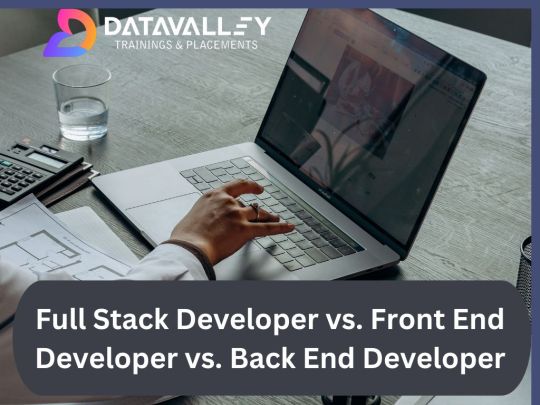
The role of a web developer is always included in the lists of high-paying IT jobs. This is because web developers are essential in today’s digital world. They create amazing websites, high-performing e-commerce sites, and other web-based applications. If you want to be a web developer, you must understand that full-stack developer skills are in great demand. However, do you understand the differences between full-stack, front-end, and back-end web development? In this post, we’ll see the differences between these three job roles, skills, and salaries.
What is Web Development?
The process of developing a website on the internet is known as web development. The non-design components of a website, such as building features and functioning with programming, markup, and scripting languages, are referred to as web development. Developers focus on technical aspects of website development such as architecture, programming, and application integration, as well as visuals.
A web developer is someone who does the following:
Creates and maintains webpages and other web-based applications.
Creates a website from a web design.
They collaborate with clients, stakeholders, and designers to understand the concept.
Can focus on frontend or backend development. Even as a full-stack developer, if necessary.
Types of Web Development
Front End Development: This aspect of web development focuses on what the user interacts with directly, i.e., the user interface of a website or web application. Front-end development deals with the design, layout, and interactivity of a site, ensuring that it’s visually appealing and user-friendly.
Back End Development: The back end is the part of a website or application that operates behind the scenes. It manages data, user authentication, and the server-side logic, ensuring the smooth functioning of the website.
Now, let’s delve into each of these roles in detail.
What is front-end development?
Front-end development, often referred to as client-side development, is the process of creating the visual elements of a website or web application that users interact with directly. It involves writing code for the user interface, optimizing website performance, and ensuring the site looks and functions correctly on various devices and browsers.
Who is a front-end developer?
A front-end developer, also known as a client-side developer, is responsible for turning web designs into a functioning website or application. They work closely with web designers and back-end developers to create an engaging and responsive user experience.
What are the front-end developer’s skills?
Front-end developers should be proficient in the following skills:
Mastery of HTML (Hypertext Markup Language) and CSS (Cascading Style Sheets) is fundamental for structuring and styling web pages.
Proficiency in JavaScript is crucial for adding interactivity and dynamic features to a website.
Knowledge of front-end frameworks like React, Angular, or Vue.js, which simplify and expedite development.
The ability to create websites that look and function well on various devices and screen sizes.
Ensuring that the website performs consistently across different browsers.
Familiarity with version control systems like Git for code management and collaboration.
Front End Developer Salary
The salary of a front-end developer can vary based on factors such as experience, location, and the company. On average, junior front-end developers can earn between $50,000 and $70,000 annually, while senior front-end developers can command salaries ranging from $90,000 to $120,000 or more.
What is Back End Development?
Back-end development, often referred to as server-side development, focuses on the server and database sides of a website or web application. It involves building and maintaining the server, databases, and applications that enable the front end to function correctly.
Who is a Back End Developer?
A back-end developer is responsible for managing the server, databases, and server-side logic of a website or application. They ensure that data is stored securely, accessed efficiently, and transmitted effectively between the front end and back end.
What are Back End Developer Skills?
Back-end developers should have expertise in the following areas:
Server-Side Programming Languages: Proficiency in languages such as Python, Ruby, Node.js, PHP, or Java is used to build server-side applications.
Databases: Knowledge of database management systems like MySQL, PostgreSQL, MongoDB, and NoSQL databases.
APIs: The ability to create and manage APIs (Application Programming Interfaces) for communication between the front end and back end.
Server Management: Skills in managing web servers and server infrastructure.
Security: Understanding web security practices and techniques to protect user data.
Version Control/Git: Proficiency in version control systems to manage and collaborate on code.
Back End Developer Salary
Back-end developer salaries can also vary based on experience, location, and the organization. Junior back-end developers can earn an annual salary ranging from $60,000 to $90,000, while senior back-end developers can expect salaries ranging from $100,000 to $150,000 or more.
Frontend vs. Backend Development
Front-end and back-end development are two halves of a whole, and they must work together seamlessly to create a functional website or application. While front-end developers focus on user interface and design, back-end developers deal with the underlying server infrastructure and data management. Both roles are essential for a successful web project.
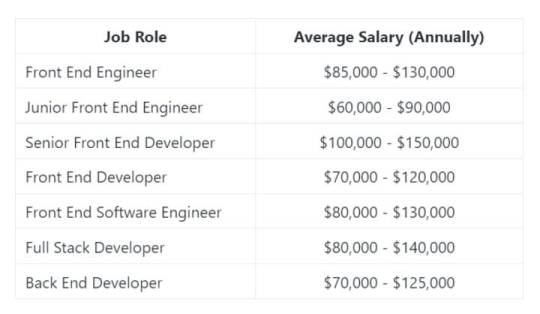
What is a Full Stack Developer?
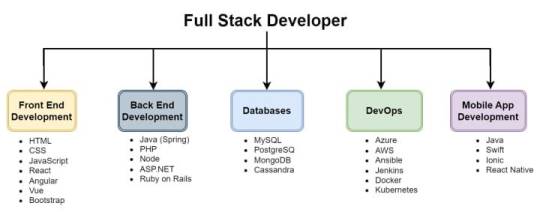
Who is a Full Stack Developer?
A full stack developer is a well-rounded professional who can take care of every aspect of web development, from designing the user interface to managing databases and server-side logic. They bridge the gap between front end and back-end development, ensuring that the entire application functions cohesively.
What are the Full Stack Developer Skills?
Full stack developers need a broad range of skills, including:
HTML/CSS: Proficiency in front end technologies for web page structuring and styling.
JavaScript: Mastery of JavaScript for creating dynamic and interactive web elements.
Front End Frameworks: Knowledge of front-end frameworks for efficient development.
Server-Side Programming Languages: Expertise in languages like Node.js, Python, Ruby, or Java for server-side development.
Databases: Proficiency in database management systems for data storage and retrieval.
APIs: Ability to create and manage APIs for communication between the front end and back end.
Version Control/Git: Familiarity with version control systems for code management.
Problem-Solving: Strong analytical and problem-solving skills to troubleshoot and optimize web applications.
Full Stack Developer Salary
Full-stack web developers are in high demand due to their range of skills and extensive knowledge. An average full stack developer’s annual salary might range from $110,000 to $150,000, based on their skill set and expertise.
Full-stack engineers earn more money than front end or back end developers. Employers agree to pay more for a full stack developer since it makes more business sense to hire one person with front and back end expertise rather than two.
As a result, the profession of a full stack developer is a profitable alternative for aspirants looking to create a career in the digital business.
The choice between becoming a full stack developer, front end developer, or back end developer depends on your interests, strengths, and career goals. Front end developers excel at creating visually appealing and user-friendly interfaces; back end developers focus on the server-side and data management; and full stack developers possess a comprehensive skill set that allows them to manage the entire development process. Each role is integral to the web development ecosystem, and the right one for you depends on your passions and aspirations within the field.
If you’re considering the path of a full stack developer and are eager to acquire the comprehensive skill set required to excel in this role, we have an excellent suggestion for you. Consider enrolling in the Full Stack Developer course at Datavalley.
Datavalley has a stellar track record of empowering aspiring developers with the knowledge and expertise to succeed in the dynamic world of web development. Their course covers everything from the fundamentals of HTML and CSS to in-depth training in JavaScript, front end and back end frameworks, and much more.
By joining Datavalley’s Full Stack Developer course, you’ll gain hands-on experience, build an impressive portfolio, and be well-prepared for a rewarding career in web development.
Don’t miss out on this opportunity to kickstart your journey as a Full Stack Developer with Datavalley. Your future in web development awaits. Take the first step today!
Attend Free Bootcamp at Datavalley
If you’re looking to supercharge your Java development skills and become a full-stack Java developer, consider joining the Java Full Stack Developer bootcamp at Datavalley. It’s an excellent opportunity to enhance your expertise and take your career to the next level.
Key points about Bootcamps:
It is completely free, and there is no obligation to complete the entire course.
20 hours total, two hours daily for two weeks.
Gain hands-on experience with tools and projects.
Explore and decide if the field or career is right for you.
Complete a mini project.
Earn a certificate to show on your profile.
No commitment is required after bootcamp.
Take another bootcamp if you are unsure about your track.
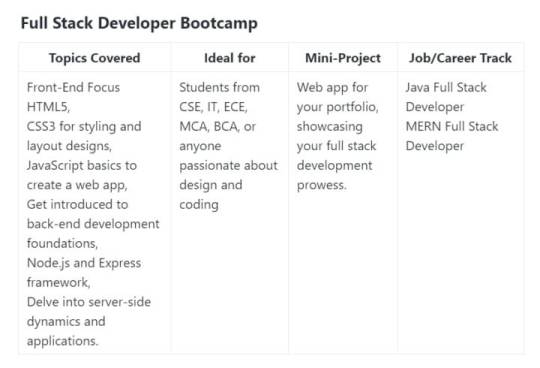
#datavalley#dataexperts#data engineering#data analytics#dataexcellence#business intelligence#data science#power bi#data analytics course#data science course#full stack course#full stack training#full stack web development#full stack developer#full stack software developer#front end developers#back end development
7 notes
·
View notes
Text
"Discover Your Path: Online and Offline Learning at Melonia Academy"
No matter your learning style or schedule, Melonia Academy is committed to providing you with the resources and support you need to succeed. Enroll today and take the first step towards a brighter future with us.
3 notes
·
View notes
Text
Mastering Full Stack Development: Your Path to a Bright Future
In today's competitive job market, gaining practical skills is crucial. Our Full Stack Development Course with Placement offers a comprehensive curriculum covering both front-end and back-end development. With hands-on projects and expert guidance, you'll be equipped to tackle real-world challenges. Plus, our dedicated placement assistance ensures that you're on the right track to secure rewarding job opportunities in the tech industry.
2 notes
·
View notes
Text

WEB DESIGN COURSES
2 notes
·
View notes
Text
#code#full s#full stack course#full stack training#full stack web development#full stack developer#course#training#curse in pune
2 notes
·
View notes
Text
Full Stack Developer Course Duration and Fees
Are you considering a career as a Full Stack Developer? Understanding the course duration and fees can be crucial in making informed decisions about your education and career path. Let's dive into the details of what you can expect when pursuing a Full Stack Developer course.
Course Duration
The duration of a Full Stack Developer course can vary depending on various factors such as the institute, curriculum, and learning format (part-time, full-time, online, offline). Typically, a Full Stack Developer course can range from a few months to a year or more. Here's a breakdown of common durations:
1. Bootcamp Style Courses
These intensive programs are often designed to be completed in a few months, ranging from 3 to 6 months. They are immersive and focus on hands-on learning to quickly prepare students for entry-level roles.
2. Part-Time Courses
If you're balancing work or other commitments, part-time courses may span anywhere from 6 months to a year. They offer flexibility but may take longer to complete compared to full-time programs.
3. Full-Time Courses
Full-time Full Stack Developer courses are typically more immersive and intensive, lasting around 3 to 9 months. They require a significant time commitment but can fast-track your learning.
4. Online Courses
Online Full Stack Developer courses often provide self-paced learning options, allowing you to complete the course in your own time. The duration can vary widely, from a few months to a year or longer.
Fees
The fees for Full Stack Developer courses can also vary based on factors like the institute's reputation, course format, curriculum depth, and additional resources provided. Here's what you can expect regarding fees:
1. Bootcamp Style Courses
These intensive programs may have lower fees compared to longer courses, ranging from a few thousand to several thousand dollars.
2. Part-Time and Full-Time Courses
These courses typically have higher fees due to their comprehensive nature and instructor-led learning. Fees can range from a few thousand to tens of thousands of dollars, depending on the institute and course duration.
3. Online Courses
Online Full Stack Developer courses often offer a more affordable option, with fees ranging from a few hundred to a few thousand dollars. However, keep in mind that the quality and depth of online courses can vary widely.
Factors to Consider:
When evaluating Full Stack Developer courses based on duration and fees, consider the following factors:
1. Curriculum Quality
Look for courses that cover a comprehensive range of technologies and industry best practices.
2. Instructor Expertise
Check the qualifications and experience of instructors to ensure high-quality teaching.
3. Job Placement Support
Research if the institute offers job placement assistance or networking opportunities.
4. Reviews and Testimonials
Seek feedback from past students to gauge the course's effectiveness and value for money.
In conclusion, the duration and fees of a Full Stack Developer course can vary significantly, and it's essential to choose a program that aligns with your learning style, career goals, and budget. Conduct thorough research, consider your options carefully, and embark on your journey to becoming a proficient Full Stack Developer.
#full stack course in pune#full stack training in pune#full stack classes#full stack course#full stack training
2 notes
·
View notes
Text
A Principal Full Stack Developer is a senior-level professional responsible for overseeing the end-to-end development process of web applications, from front-end to back-end. They lead teams, architect solutions, and ensure the technical quality and scalability of projects. Their expertise spans multiple programming languages, frameworks, and technologies, allowing them to design robust, efficient systems. With a focus on both technical excellence and strategic vision, they drive innovation, mentor junior developers, and collaborate closely with stakeholders to deliver high-quality software solutions.
2 notes
·
View notes
Text
Next in my series of applying my MBA to fandom: Tommy Shelby's Business Case for the Monaghan Boy Race Fixing Scam
Revelation: exactly how fucking high is this man's financial risk tolerance!!?!? Without limitation! and what the fuck is this asset structure? the liquidity?! the ratios are whack, Mr Greene!
Recommendation: do not buy shares in Shelby Company Ltd
#unless you marry into the family#i should do Mr Greene bystander fic i only alluded to his legal necessity in one fic due to the 1929 legislative change RE Corporations Act#Sole Independent Director on Shelby Co Ltd Board representative of all shareholders#at some point he just sits down with Tommy and says like#'of course it's all money laundering do you think I'm stupid? I spend my life becoming Independent Director on the boards of your type-#-of 'family' company; when you hit financial strife which is invariably inevitable I will of course buy your business out from under you'#and tommy contemplates (his gun) the true nature of the crimes of those born to wealth yet again#interestingly SK put EXACTLY the minimum financial/turnover information scattered across S1 episodes to actually populate a business case-#-for the MB scam which leads me to believe he might have actually (or had someone) write the BC to ensure it stacked up#with theeee most narrowest of margins#Can i just say Tommy using actual corporate terms does more for me than any of his sex scenes anywhere#'Good Corporate Hygiene' he says pallid and rage-furious in a room full of fucking Irish-American gangsters or whatever the fuck#the flutter in the gut when he said vaguely while traumatically disassociating 'land. I'm buying land'#the throes of schaudenfreude watching him try to administer a rigid meeting agenda (while his family tolerantly roll their eyes at him)
2 notes
·
View notes
Text
Unveiling the Essential Role of Full Stack Developers in Modern Web Development
Introduction:
Within the dynamic realm of web development, full stack developers stand out as indispensable assets, offering a unique blend of expertise in both frontend and backend technologies. Their versatility enables them to navigate through various aspects of web application development, from crafting user interfaces to managing databases and server-side logic.
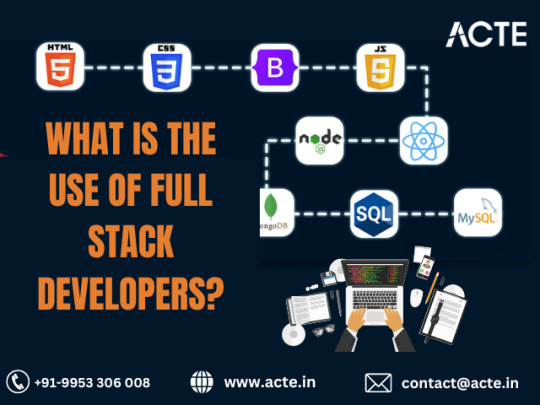
In this article, we'll delve into the essential role of full stack developers, shedding light on their pivotal contributions to streamlining development processes and fostering innovation within the industry.
1. Comprehensive Development Capabilities:
An integral aspect of full stack developers lies in their adeptness at overseeing end-to-end development projects. From initial concept to deployment, these professionals are proficient in every stage of the development lifecycle. They excel at designing intuitive user interfaces, implementing intricate frontend functionality, crafting robust backend logic, seamlessly integrating databases, and orchestrating smooth deployment of applications. This holistic approach ensures coherence and uniformity across the entirety of the project.
2. Proficient Problem Solvers:
Full stack developers possess a profound understanding of both frontend and backend technologies, equipping them with the skills to address issues at varying levels of the application stack. Their extensive skill set enables them to identify and resolve challenges efficiently, thereby minimizing downtime and ensuring the seamless operation of web applications. Whether it entails debugging frontend UI glitches or optimizing backend performance, full stack developers excel in devising effective solutions to intricate technical hurdles.
3. Collaborative Cross-Functional Engagement:
Effective collaboration is paramount in any development endeavor, and full stack developers are adept at fostering cross-functional teamwork. With their comprehensive grasp of frontend and backend technologies, they facilitate seamless communication and collaboration among designers, frontend developers, backend developers, and project managers. This cohesive teamwork ensures alignment on project objectives and facilitates smooth execution of tasks throughout the development journey.
4. Streamlined Development Processes:
The presence of a single developer proficient in both frontend and backend tasks results in a more streamlined and efficient development process. Full stack developers seamlessly transition between frontend and backend development, thereby mitigating communication gaps and reducing the need for handoffs between different team members. This streamlined approach translates into faster development cycles, rapid iterations, and ultimately, shortened time-to-market for web applications.
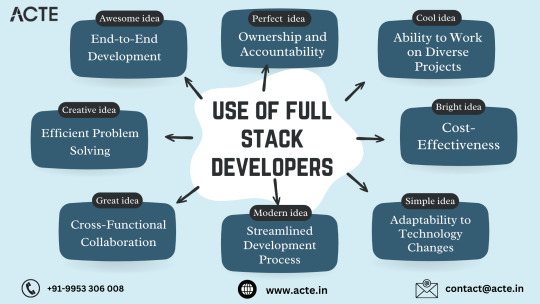
5. Adaptability to Technological Advancements:
In a landscape characterized by constant evolution, full stack developers are well-equipped to adapt to emerging trends and integrate new technologies into their projects. Their ability to stay abreast of the latest developments ensures they remain at the forefront of innovation in web development, thereby enabling them to deliver cutting-edge solutions tailored to meet the evolving needs of clients and users alike.
6. Cost-Efficiency:
Employing separate specialists for frontend and backend development can incur substantial costs for businesses. Conversely, engaging a full stack developer who can adeptly handle both roles offers a more cost-effective alternative. This approach not only reduces development expenditures but also minimizes overhead and administrative burdens associated with project management. Furthermore, having a singular point of contact for development tasks enhances communication and expedites decision-making processes.
7. Versatility in Project Execution:
Full stack developers possess the versatility to tackle a diverse array of projects, ranging from simple websites to complex web applications. This flexibility enables them to address varied challenges and contribute effectively to a wide spectrum of projects. Whether it involves crafting e-commerce platforms, content management systems, or social networking sites, full stack developers boast the expertise and adaptability to deliver bespoke solutions tailored to the unique requirements of each project.
8. Ownership and Commitment:
Often assuming ownership of the projects they undertake, full stack developers exhibit a heightened sense of accountability and dedication. This intrinsic ownership fosters a greater commitment to project success, as developers become personally invested in achieving favorable outcomes. By assuming responsibility for the entire development process, full stack developers ensure projects are delivered punctually, within budget constraints, and in adherence to the highest quality standards.
Conclusion:
In summary, full stack developers occupy a pivotal position in the realm of web development, leveraging their versatile skill sets and comprehensive understanding of frontend and backend technologies to drive innovation and excellence. By harnessing the unique capabilities of full stack developers, businesses can streamline development processes, stimulate innovation, and deliver unparalleled web experiences to their audience.
#full stack developer#education#information#full stack web development#front end development#frameworks#web development#backend#full stack developer course#technology
4 notes
·
View notes